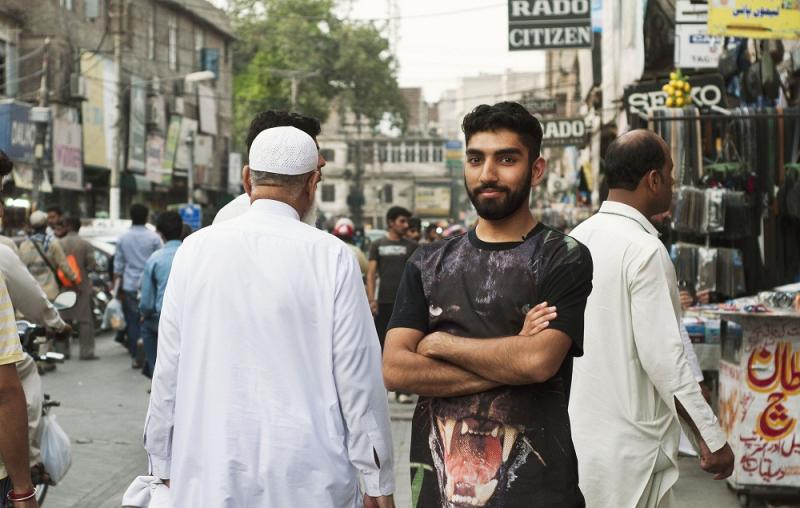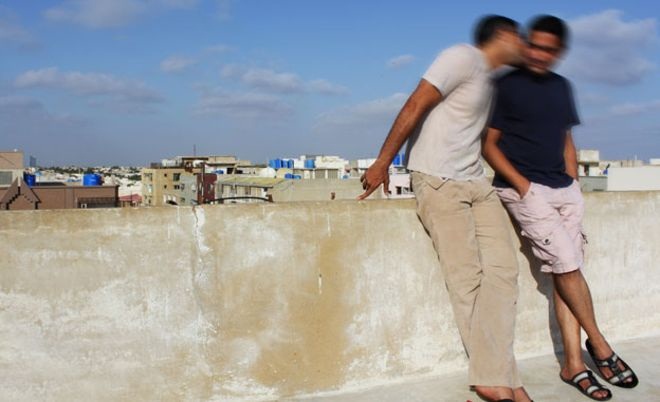How Gay Is Pakistan?, BBC Three | reviews, news & interviews
How Gay Is Pakistan?, BBC Three
How Gay Is Pakistan?, BBC Three
Returning émigré Mawaan Rizwan discovers unexpected facets of gay life

As a YouTube comic Mawaan Rizwan is clearly at ease on screen, and right at the beginning of How Gay Is Pakistan? he was telling us about coming out as gay to his family last year: it was “the worst news ever for Pakistani parents”.
“Exciting but scary” was his first impression of the place, and it took a while for Rizwan to get down to the meat of his subject, rather diverted by his visit to a Karachi market to equip himself with local costume, playing comedian rather than presenter. Just occasionally this seemed like a holiday programme gone awry, diverted to a location no-one advises for holidays anymore, but it’s rare, and rather salutary, to get a television glimpse of everyday life in Pakistan which takes us beyond the usually grim news headlines.
If there hadn’t been a television camera on hand, it might have ended in violence
It’s a country of contradictions, with sophistication and poverty at the heart of Rizwan’s discoveries. The well-off exist in a world in which homosexuality has an accepted, if mostly unspoken place – a scene sustained by social media – with clubs taken over by gay men and women for dancing that, Rizwan reminded us more than once, felt like Soho. Few were shy of a television camera, including one guest who, while admitting that if your sexuality became public knowledge, “They can kill us”, revealed the alibi that he told his own family each time he went out. I know we keep being told how small BBC Three’s audience is, but you must wonder how long that anonymity is going to last.
At the other extreme, in the labourer communities of Lahore, the concept of gayness hardly existed: instead it was MSM – men sleeping with men – not because of sexual preference, but because they couldn’t afford women prostitutes. A good thing then that there was an excellent voluntary health awareness organization handing out condoms, and generally explaining what was what. The tragedies come in rural communities, where any hint of difference can be punished with violence: we didn’t see what was happening in a video of one such case, but Rizwan’s word that it was too grim for broadcast was enough.
The central subject he chose was the transgender world of Kami, and her partner Sid: they were the nightclub party-givers, though their home world looked far from affluent. Their dream was to be married in South Africa by an Imam who apparently endorses homosexual marriage within Islam. Rizwan visited a number of very articulate professionals, from lawyers – Pakistan’s anti-gay legislation is a direct hand-over from the legal system of the British Empire – to health-workers. When he went off with Kami and Sid to consult a marriage counsellor about their plan, she seemed to endorse the idea, until they said they were planning to return to Pakistan as a married couple. “Now I’m feeling tense,” the counsellor admitted.
 The future of their friend Shahzadi, another transgender woman who was debating whether to proceed with sex-change surgery, looked equally uncertain. Her adolescence and growing awareness that she had the “soul of a woman” had been accompanied by violence and rape – there’s a terrible awareness of the degrees of cruelty when someone remembers what it’s like to be “properly beaten”. That didn’t prevent Kami and Shahzadi heading off to the bazaar to shop for a wedding-dress. Kami wanted something traditional, and the shopkeeper must have been surprised to be asked by Rizwan if such shopping requests “happened often”. For him, it was haram, but he stopped at words. Less so those who congregated around the couple on the street: if there hadn’t been a television camera on hand (and presumably a security escort, too), it might have ended in violence. “For us it’s normal, by the way,” was the telling comment from the ladies.
The future of their friend Shahzadi, another transgender woman who was debating whether to proceed with sex-change surgery, looked equally uncertain. Her adolescence and growing awareness that she had the “soul of a woman” had been accompanied by violence and rape – there’s a terrible awareness of the degrees of cruelty when someone remembers what it’s like to be “properly beaten”. That didn’t prevent Kami and Shahzadi heading off to the bazaar to shop for a wedding-dress. Kami wanted something traditional, and the shopkeeper must have been surprised to be asked by Rizwan if such shopping requests “happened often”. For him, it was haram, but he stopped at words. Less so those who congregated around the couple on the street: if there hadn’t been a television camera on hand (and presumably a security escort, too), it might have ended in violence. “For us it’s normal, by the way,” was the telling comment from the ladies.
Rizwan’s visit to a revered Imam for advice was revealing, though less so for the medicine that he was prescribed to “cure” his homosexuality. The religious figure's dogma, that the “hole made by God for the exit of waste material is not for sex”, may have been formulaic, but his advice – effectively, “get out of your homeland” – looked practical. What wasn’t touched on here – for that, it’s worth listening to Mobeen Azhar’s 2013 Radio Four Crossing Continents programme Inside Gay Pakistan – was the hypocrisy involved on all fronts. “Blind-eye” toleration suits those in power just fine, which explains why no legislator is going to go out on a limb to question the law as it stands (depressingly, the overturning of comparable legislation in neighboring India was itself recently reversed). That programme told us that the national language, Urdu, doesn’t even have a respectful, objective word for “homosexuality”. Language in How Gay Is Pakistan? also seemed problematic, albeit for a different reason: almost every sentence here jumped back and forth between English and Urdu, phrases as mixed-up as the wider context that they were trying to explicate. (Blurred faces in image of men in Karachi, from Azhar's programme, pictured above © BBC.)
Where Azhar discovered how gay life often continues within the fabric of marriage, Rizwan spent more time with the Hijra transgender-transsexual community, quasi-family units that adopt and to some extent unite those vilified by society: each group has its own guru, and if Shahzadi was to proceed with castration, it would be against the advice of hers (closing titles revealed that she had chosen that path). We saw something of the Hijras in Stephen Fry: Out There, and it was good to have the subject explored more thoroughly. Rizwan was never just the outside observer here, a factor that gave his film considerable extra engagement. “Not as bad as I expected,” wasn’t exactly Rizwan’s conclusion – and it’s probably not a slogan which the Tourist Board is going to adopt – but he came away convinced that Pakistan, as a society, was actually quite gay, as well as very glad that he was coming back to life in London’s Zone Two. “Big, brave steps” may be being taken in the gay community there, but what a difficult, long journey lies ahead.
Add comment
The future of Arts Journalism
You can stop theartsdesk.com closing!
We urgently need financing to survive. Our fundraising drive has thus far raised £49,000 but we need to reach £100,000 or we will be forced to close. Please contribute here: https://gofund.me/c3f6033d
And if you can forward this information to anyone who might assist, we’d be grateful.

Subscribe to theartsdesk.com
Thank you for continuing to read our work on theartsdesk.com. For unlimited access to every article in its entirety, including our archive of more than 15,000 pieces, we're asking for £5 per month or £40 per year. We feel it's a very good deal, and hope you do too.
To take a subscription now simply click here.
And if you're looking for that extra gift for a friend or family member, why not treat them to a theartsdesk.com gift subscription?
more TV
 Murder Before Evensong, Acorn TV review - death comes to the picturesque village of Champton
The Rev Richard Coles's sleuthing cleric hits the screen
Murder Before Evensong, Acorn TV review - death comes to the picturesque village of Champton
The Rev Richard Coles's sleuthing cleric hits the screen
 Black Rabbit, Netflix review - grime and punishment in New York City
Jude Law and Jason Bateman tread the thin line between love and hate
Black Rabbit, Netflix review - grime and punishment in New York City
Jude Law and Jason Bateman tread the thin line between love and hate
 The Hack, ITV review - plodding anatomy of twin UK scandals
Jack Thorne's skill can't disguise the bagginess of his double-headed material
The Hack, ITV review - plodding anatomy of twin UK scandals
Jack Thorne's skill can't disguise the bagginess of his double-headed material
 Slow Horses, Series 5, Apple TV+ review - terror, trauma and impeccable comic timing
Jackson Lamb's band of MI5 misfits continues to fascinate and amuse
Slow Horses, Series 5, Apple TV+ review - terror, trauma and impeccable comic timing
Jackson Lamb's band of MI5 misfits continues to fascinate and amuse
 Coldwater, ITV1 review - horror and black comedy in the Highlands
Superb cast lights up David Ireland's cunning thriller
Coldwater, ITV1 review - horror and black comedy in the Highlands
Superb cast lights up David Ireland's cunning thriller
 Blu-ray: The Sweeney - Series One
Influential and entertaining 1970s police drama, handsomely restored
Blu-ray: The Sweeney - Series One
Influential and entertaining 1970s police drama, handsomely restored
 I Fought the Law, ITVX review - how an 800-year-old law was challenged and changed
Sheridan Smith's raw performance dominates ITV's new docudrama about injustice
I Fought the Law, ITVX review - how an 800-year-old law was challenged and changed
Sheridan Smith's raw performance dominates ITV's new docudrama about injustice
 The Paper, Sky Max review - a spinoff of the US Office worth waiting 20 years for
Perfectly judged recycling of the original's key elements, with a star turn at its heart
The Paper, Sky Max review - a spinoff of the US Office worth waiting 20 years for
Perfectly judged recycling of the original's key elements, with a star turn at its heart
 The Guest, BBC One review - be careful what you wish for
A terrific Eve Myles stars in addictive Welsh mystery
The Guest, BBC One review - be careful what you wish for
A terrific Eve Myles stars in addictive Welsh mystery
 theartsdesk Q&A: Suranne Jones on 'Hostage', power pants and politics
The star and producer talks about taking on the role of Prime Minister, wearing high heels and living in the public eye
theartsdesk Q&A: Suranne Jones on 'Hostage', power pants and politics
The star and producer talks about taking on the role of Prime Minister, wearing high heels and living in the public eye
 King & Conqueror, BBC One review - not many kicks in 1066
Turgid medieval drama leaves viewers in the dark
King & Conqueror, BBC One review - not many kicks in 1066
Turgid medieval drama leaves viewers in the dark
 Hostage, Netflix review - entente not-too-cordiale
Suranne Jones and Julie Delpy cross swords in confused political drama
Hostage, Netflix review - entente not-too-cordiale
Suranne Jones and Julie Delpy cross swords in confused political drama

Comments
I grew up in Pakistan and I
WHATS THE NAME OF THE SONG AT